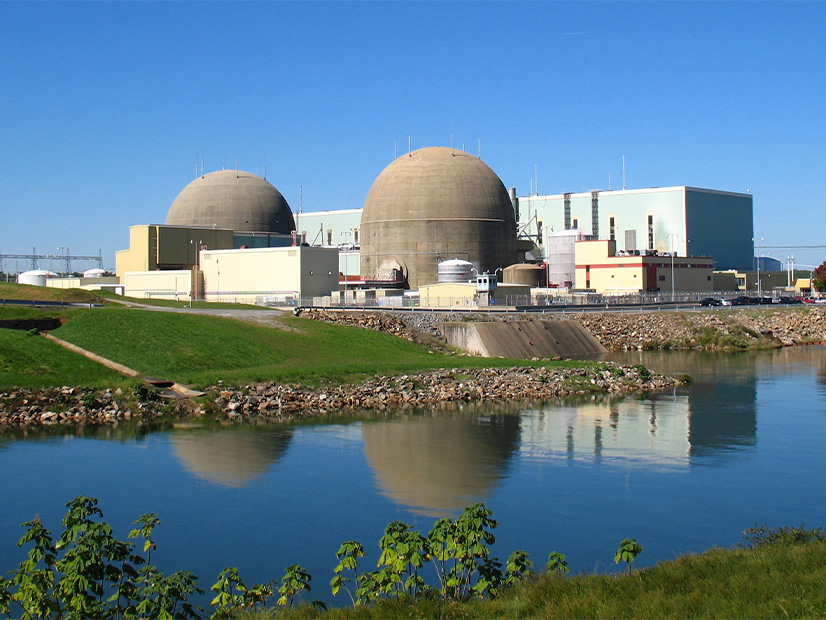
Dominion Energy will pay SERC Reliability $150,000, and the Long Island Power Authority will pay $96,000 to the Northeast Power Coordinating Council, for violations of NERC reliability standards, according to settlements between the utilities and regional entities recently approved by FERC (NP24-8).
NERC submitted the settlements to FERC on May 30 in its monthly spreadsheet notice of penalty, along with a separate NOP and spreadsheet NOP regarding violations of the Critical Infrastructure Protection (CIP) standards. Those documents were announced but not made public in accordance with NERC and FERC’s policy on critical electric infrastructure information. FERC said in a filing at the end of June it would not further review the settlement, leaving the penalties intact.
Dominion’s settlement involves the utility’s Virginia nuclear division, which operates the North Anna and Surry nuclear facilities in Louisa and Surry counties, respectively. According to SERC, the utility notified the RE in January 2022 that it was in violation of VAR-002-4.1 (generator operation for maintaining network voltage schedules), which requires generator operators to provide reactive support and voltage control to protect equipment and maintain reliability.
Dominion reported to SERC that during preparations for an upcoming audit in December 2021, it discovered the nuclear stations operated outside their assigned voltage schedules for longer than 30 minutes with no notification to the transmission operator as required by the TOP’s procedure. The utility discovered 1,421 instances of noncompliance since 2020.
According to the filing, Dominion determined the cause was a discrepancy in its voltage data monitoring parameters that caused its control room voltage to read up to four kV lower than the actual voltage. As a result, operators “did not recognize they were operating outside the assigned voltage schedules.”
SERC determined the noncompliance began in 2007 under the previous version of the standard, VAR-002-1, even though Dominion did not review data prior to 2020 because it “was focused on correcting and mitigating the noncompliance moving forward.” The RE said it determined this date because the transmission owner’s voltage schedules had not changed since 2007 and the discrepancy in the control room parameters had existed prior to the discovery.
SERC said the violation was caused by deficient procedural guidance, which did not require notifying the TOP when operating outside the voltage schedule for longer than 30 minutes, along with ineffective voltage monitoring controls. According to the RE, the infringement posed a “moderate” risk because the failure to maintain the voltage schedule and inform the TOP of the voltage excursions “could have delayed the TOP’s ability to respond to deviations … potentially resulting in damage to the system or [grid] instability.”
Dominion’s mitigating actions include modifying the control room monitors to display the correct generator output voltage, revising the voltage schedule bandwidth for its generators to match the PJM default, and implementing auditory and visual alarms to alert control room personnel before generating units reach the voltage schedule limits.
LIPA Corrects Ratings Mistakes
NPCC’s settlement with LIPA involved a violation of FAC-008-3 (facility ratings). The utility reported the infringement to the RE in November 2020, before the standard was replaced by FAC-008-5.
LIPA told NPCC that during an extent of condition review, it conducted a walkdown of its facilities subject to NERC standards. The walkdown resulted in LIPA identifying 15 138-kV facilities with ratings that did not consider the most limiting element, as required by the utility’s facility ratings methodology. In addition, nine cables had incorrect seasonal facility ratings, also a violation of FAC-008-3.
During a later walkdown in 2023, LIPA found an additional two 138-kV cables that were operating in the field in static mode, with incorrect ratings being used in the energy management system for real-time system operation.
The RE determined the root cause of the misratings in the 138-kV facilities to be “ineffective internal procedures for ensuring the accuracy of facility ratings,” while the cause of the nine cable misratings was a database transposition error. For the 138-kV cables discovered in 2023, NPCC said the root cause was an ineffective detective control that did not alert personnel of a field configuration change.
LIPA’s mitigation actions have not concluded yet; the utility has promised to correct the ratings for all noncompliant facilities, conduct a field review of all 138-kV transmission support structures and conductor spans, improve an existing tool to facilitate seasonal rating changes and perform field checks on pumping plants that use circulate ratings to ensure they are used correctly.



